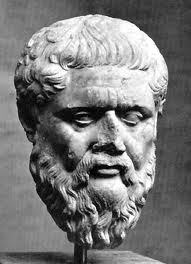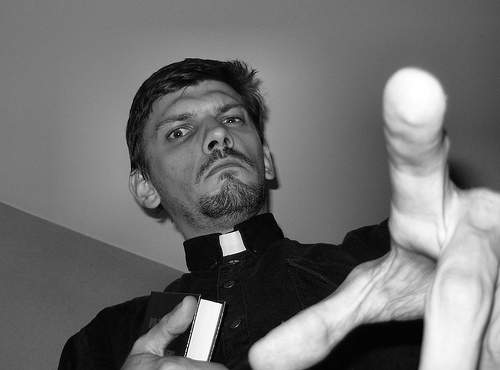Andrew Cort's Blog, page 6
September 8, 2014
Plato’s TIMAEUS
 In the Timaeus, the most metaphysical of Plato’s writings and the one most influenced by Pythagoras, Plato returned to a consideration of science and the natural world; two subjects which Socrates had abandoned long ago. It is not like most of his other writings. Socrates is present, but he plays only a minor role. The book is not really a ‘dialogue’, aside from a brief introductory conversation. It is mostly a monologue, in which the character named Timaeus weaves an all-encompassing myth of creation.
In the Timaeus, the most metaphysical of Plato’s writings and the one most influenced by Pythagoras, Plato returned to a consideration of science and the natural world; two subjects which Socrates had abandoned long ago. It is not like most of his other writings. Socrates is present, but he plays only a minor role. The book is not really a ‘dialogue’, aside from a brief introductory conversation. It is mostly a monologue, in which the character named Timaeus weaves an all-encompassing myth of creation.
Plato warns us that his myths and parables are not to be taken literally. This, however, is not equivalent to saying that they should not be taken seriously. On the contrary, they are symbolic illustrations of what for Plato is most true and important, and he uses them at the uppermost reaches of his thought, where our common expository language fails.
Like Thales, Plato here is asking the fundamental scientific question, “What is the essential nature of reality?” Like Pythagoras and contemporary physicists, the answer he gives is mathematical rather than material. The book is a difficult and startling document, which attempts to explain everything from the meaning and purpose of creation, to the structure of matter, the wonders of nature, the plan of the heavens, and even the principles of medicine, physiology, and psychology. It has been of unprecedented importance in the history of western thought.
****
You can find out more about the Timaeus in my book LOVE, WISDOM, AND GOD: The Longing of the Western Soul. I discuss it at great length.
September 7, 2014
“PEACE FESTIVAL – 2014″
 Please consider this your personal invitation and be our guest! International Gurukula Community cordially invites you to the “Peace Festival – 2014”
Please consider this your personal invitation and be our guest! International Gurukula Community cordially invites you to the “Peace Festival – 2014”
Sunday, September 14, 2014
3:00 pm – 7 pm
4 West 43rd Street (between 5th & 6th Ave.), Ball Room, New York City , NY 10036
Meditation, Kirtan, Bhajan, Music, Art Show, Interfaith Prayers, Mantras & Discussion on Peace, Yoga, Spiritual Songs & Dance, Award Ceremony and Pot Luck Party!
Part I: 3pm – 4:15pm : Yoga Asana class/Demonstration/Competition (optional)
Part II: 4:30pm – 6pm : Meditation, Bhajan/Kirtan/Music/Dance/Discussion
6pm – 6:45pm : Prayers/Award Ceremony
6:45pm : Potluck Party and entertainments
People can choose to attend Part I or Part II or both
Organized by
International Gurukula Community, Inc. , UTS Interfaith Seminary, Memi International, Studio Anand NY, Ahmadiyya Muslim Community
Contact
Email: gurudileepji@yahoo.com
Dil: 917 300 3060, Remi: 347 444 3256, Anand: 917 805 9281
Please bring your family and friends, musical instruments, flowers and vegetarian food.
Donations welcome!
Love*Light*Peace
3pm – 4:15pm – Yoga Asana Class, Demonstration, Competition & Meditation guided by Guru Dileepji
4:30pm – 6pm – Meditation, Kirtan, Bhajan, Dance, Panel Discussion on Peace, Devotional songs, Music by our Guest Speakers, Artists, SpirItual Leaders and members from different ethnic community groups
6pm – 6:45pm – Interfaith Prayers, Award Ceremony, Peace Celebration by Consul General of India and other Special guests (see website http://www.igchq.org/events.html )
6:45pm – Pot Luck Party and entertainments
September 3, 2014
A Beatitude: Mercy and Forgiveness
 A good reminder in today’s world.
A good reminder in today’s world.
“Blessed are the merciful, for they shall obtain mercy.”
Unless we show mercy and forgiveness towards others, Christ teaches in this fundamental statement of karma, we will not receive mercy or forgiveness for ourselves.
The Greek word for mercy, eleemon, means to actually feel and suffer with another person, to be intensely aware of their pain, to see things through their eyes, to feel things as they feel them, and to experience a deep personal yearning for their physical and spiritual well-being since it is also our own.
This requires an extremely high level of consciousness that recognizes and experiences the perfect Oneness of all life. This is beyond us, but we can begin at our level of consciousness with attempts to control our feelings of self-importance, and to put ourselves in others’ ‘shoes’, trying to understand what they think and feel and need. When we do this, our feelings of negativity toward others begin to dissipate so that we are left with only understanding and forgiveness.
In precisely the same measure as we do this, our own ‘sins’ can be forgiven.
***
A Book you may like:
The Quest of the Christian Soul: A Mystical Interpretation of the Gospels
September 1, 2014
Honoring Labor, Not the Lies
Protecting the Promise of Labor Day: Five Ways Workers are Under Attack
by Zaid Jilani
 In 1897, President Grover Cleveland made Labor Day a federal holiday, reacting to pressure from unions following the contentious Pullman Strike.
In 1897, President Grover Cleveland made Labor Day a federal holiday, reacting to pressure from unions following the contentious Pullman Strike.
Over the next century, unions fought to win all sorts of benefits for Americans, ranging from widespread employer-sponsored health care to reduced workdays. But this Labor Day, many of these hard-fought benefits are under attack:
• Pensions: Thanks to federal reforms and labor activism, private sector pension plans proliferated in the twentieth century. In March of 1949, the National Labor Relations Board ruled that companies had to bargain with their unions over pensions. Walter Reuther – the famous United Auto Workers (UAW) leader who also addressed the 1963 March On Washington – demanded that Ford Motor Company offer retirement security in the form of pensions, and led his workers in a strike in order to win it. By September 1949, Ford agreed to a $100-a-month pension – a decision that had huge ramifications for pro-pension activism nationwide.
Today, pensions across the country are under attack. In 1979, 38 percent of workers in the private sector had access to a defined benefit plan. By 2010, only 15 percent had access to such a plan. Meanwhile in the public sector, both state and local governments continue to cut pensions even while handing out massive tax giveaways to corporations.
[Please read the rest of Jilani’s article here, on Bill Moyer’s page (just a click away)
August 31, 2014
Science and Religion, again
 This is a wonderful talk in all sorts of ways. What is missing, what is ALWAYS missing, is the recognition that the entire realm of religiosity is not reducible to the naive belief in an “invisible friend in the sky”. This naive (fundamentalist) idea of ‘God’ as a kind of super-human “out there” someplace, who causes things to happen and can be appealed to to give us stuff (like Santa Claus) is of course a laughingstock to rational scientists. But when a Meister Eckhart spoke of the divine, this is not what he was referring to. When Rumi wrote his poetry, this is not what he was talking about. Even today, as an example, this is not what the Dalai Lama is talking about. It is true that religion and science can never get along if religion insists that it has a place in explaining how the material world works, and science thinks it has a right to explain to us the meaning (or an allegedly “proven” lack of meaning) of life. Both sides need to mature and speak to each other like adults. They then may realize that the so-called ‘conflict’ between them is just a silly straw-man. Their work has nothing to do with each other! But to be a whole human being requires us to ponder and appreciate both endeavors — not by just blindly believing what we are told, but by truly pondering, deeply, and by thinking for ourselves.
This is a wonderful talk in all sorts of ways. What is missing, what is ALWAYS missing, is the recognition that the entire realm of religiosity is not reducible to the naive belief in an “invisible friend in the sky”. This naive (fundamentalist) idea of ‘God’ as a kind of super-human “out there” someplace, who causes things to happen and can be appealed to to give us stuff (like Santa Claus) is of course a laughingstock to rational scientists. But when a Meister Eckhart spoke of the divine, this is not what he was referring to. When Rumi wrote his poetry, this is not what he was talking about. Even today, as an example, this is not what the Dalai Lama is talking about. It is true that religion and science can never get along if religion insists that it has a place in explaining how the material world works, and science thinks it has a right to explain to us the meaning (or an allegedly “proven” lack of meaning) of life. Both sides need to mature and speak to each other like adults. They then may realize that the so-called ‘conflict’ between them is just a silly straw-man. Their work has nothing to do with each other! But to be a whole human being requires us to ponder and appreciate both endeavors — not by just blindly believing what we are told, but by truly pondering, deeply, and by thinking for ourselves.
August 30, 2014
Fundamentalist Thinking is Not Limited to Religious Nuts
 There’s yet another story doing the rounds of Facebook today, worrying about whether Jesus was an historical figure or not. It’s such a silly waste of time. It’s all the same problem, on either side of this ‘argument’. Whether it’s literal fundamentalist Christianity (“The Bible is literally true and you MUST believe it”) or literal fundamentalist Atheism (“There’s no literal truth in the Bible so you must NOT believe it”), the problem is not the difference between religion and atheism, the problem is precisely the SAMENESS in this shallow way of thinking: All that matters is whether or not the story is literally ‘true’. Poor, poor gospel writer. The message that the kingdom of heaven is WITHIN you – i.e., that what happens in the material world around you is NOT the point – means nothing. Either ‘Jesus said it’ or ‘Jesus didn’t say it’, and that’s all anybody cares about. What could be gained by pondering the MEANING of the words – well, why bother worrying about that.
There’s yet another story doing the rounds of Facebook today, worrying about whether Jesus was an historical figure or not. It’s such a silly waste of time. It’s all the same problem, on either side of this ‘argument’. Whether it’s literal fundamentalist Christianity (“The Bible is literally true and you MUST believe it”) or literal fundamentalist Atheism (“There’s no literal truth in the Bible so you must NOT believe it”), the problem is not the difference between religion and atheism, the problem is precisely the SAMENESS in this shallow way of thinking: All that matters is whether or not the story is literally ‘true’. Poor, poor gospel writer. The message that the kingdom of heaven is WITHIN you – i.e., that what happens in the material world around you is NOT the point – means nothing. Either ‘Jesus said it’ or ‘Jesus didn’t say it’, and that’s all anybody cares about. What could be gained by pondering the MEANING of the words – well, why bother worrying about that.
August 28, 2014
Meaninglessness
 A veiled feeling of meaninglessness is a primary quality of the contemporary psyche. And this belittling acceptance of ultimate insignificance provides all the necessary groundwork for selfishness, boredom, hatred, servility, violence and fear. The consequences of meaninglessness are seen throughout that disintegration of human life which is so pitilessly recorded in each day’s news report, whether it be cruelty toward oneself, toward others, or toward the earth.
A veiled feeling of meaninglessness is a primary quality of the contemporary psyche. And this belittling acceptance of ultimate insignificance provides all the necessary groundwork for selfishness, boredom, hatred, servility, violence and fear. The consequences of meaninglessness are seen throughout that disintegration of human life which is so pitilessly recorded in each day’s news report, whether it be cruelty toward oneself, toward others, or toward the earth.
This would not be able to occur so continuously and so easily if our thoughts, feelings and actions were grounded in the perception of human value and purpose in a living and sacred world. But without this inner perception, the violence and drug abuse, the racism, pollution, and disease, the rape, hunger, and homelessness, the threat of genetic catastrophe, the threat of nuclear catastrophe, plus all the anger, unhappiness, alienation and cruelty which pervade so much of human life, will automatically continue unrestrained.
This, however, is not to suggest that orthodox religious belief, blind faith, or a childish reliance on an ‘invisible friend in the sky’, is a necessary antecedent of morality. In fact, these have often been shown to lead to precisely the opposite when they support the destruction of individuality and personal conscience, and paradoxically promote contempt and hatred for much of the beauty and diversity of life and creation, rather than respect, wonder, and delight.
August 26, 2014
Propaganda
 “Propaganda”, wrote Jacques Ellul, “does not aim to elevate man, but to make him serve. It must therefore utilize the most common feelings, the most widespread ideas, the crudest patterns, and in so doing place itself on a very low level with regard to what it wants men to do and to what end. Hate, hunger, and pride make better levers of propaganda than do love or impartiality.”
“Propaganda”, wrote Jacques Ellul, “does not aim to elevate man, but to make him serve. It must therefore utilize the most common feelings, the most widespread ideas, the crudest patterns, and in so doing place itself on a very low level with regard to what it wants men to do and to what end. Hate, hunger, and pride make better levers of propaganda than do love or impartiality.”
For these and many other reasons, we now live in a culture in which style has achieved primacy over substance. Although the original conception of democracy meant that social equality was more important than a social elite, and therefore the symbols of an elite were rejected, we have now substituted the contorted alternative view that the symbols and styles of elites should be mass produced and made available to everyone.
August 13, 2014
Jews, Gentiles, and Robin Williams
August 12, 2014
A Message of Peace
An Arab restaurant owner in Jaffa made these shirts up for his staff: They say, “Jews and Arabs Refuse to be Enemies.”
You can read more about it here: http://www.jewsnews.co.il/2014/08/03/an-arab-restaurant-owner-in-israel-with-a-message-of-peace-for-the-world/




